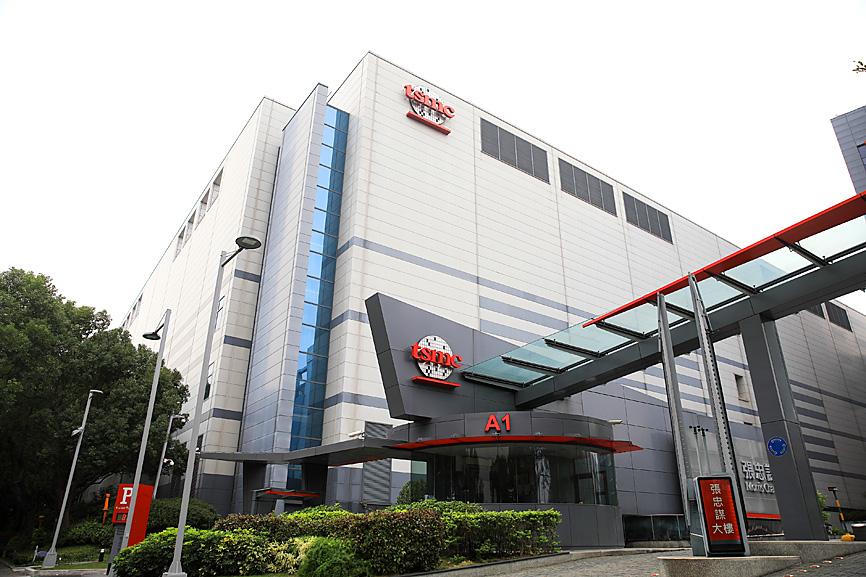Taiwan Semiconductor Manufacturing Co (TSMC, 台積電) yesterday said operations at all of its plants had returned to normal after an early morning magnitude 6.6 earthquake near Hualien caused sporadic evacuations and minor machine damage.
Technical hiccups triggered by the earthquake, which struck off the coast of Hualien County at 1:41am, had been rectified following an inspection, TSMC said.
The world’s largest contract chipmaker said that temporarily evacuated workers had all returned to production lines with the effect on operations expected to be minimal.

Photo: I-Hwa Cheng, Bloomberg
TSMC runs advanced wafer plants at the Hsinchu Science Park (新竹科學園區), the Central Taiwan Science Park (中部科學園區) and the Southern Taiwan Science Park (南部科學園區).
The earthquake reached “6 weak” on Taiwan’s seven-tier intensity scale, which gauges the actual effect of a quake, in Taitung County’s Changbin Township (長濱), hitting 5 in other parts of the county and in Hualien County.
United Microelectronics Corp (聯電), a smaller contract chipmaker with wafer plants in Hsinchu and Tainan, said that some of its production equipment had been affected by the earthquake, but that self-protection mechanisms had nullified the impact on its operations.
Fellow contract chipmaker Powerchip Semiconductor Manufacturing Corp (力積電), based primarily at Hsinchu Science Park, said the earthquake had caused a loss of only two to three hours of production.
Vanguard International Semiconductor Corp (世界先進) said it has been checking for possible effects of the earthquake at its wafer plants in Hsinchu.
Flat panel maker AU Optronics Corp (友達光電) said the quake had caused temporary suspension of some of its production, but operations had returned to normal.
Rival Innolux Corp (群創光電) also reported a temporary halt to production due to the triggering of anti-shake mechanisms.
However, the firm said the impact was expected to be minimal, with all employees safe and operations returning to normal.
Administrators at the three science parks said they had not received reports of damage from tenants, with only Southern Taiwan Science Park reporting that machines were affected, but no material impact was expected.

Semiconductor shares in China surged yesterday after Reuters reported the US had ordered chipmaking giant Taiwan Semiconductor Manufacturing Co (TSMC, 台積電) to halt shipments of advanced chips to Chinese customers, which investors believe could accelerate Beijing’s self-reliance efforts. TSMC yesterday started to suspend shipments of certain sophisticated chips to some Chinese clients after receiving a letter from the US Department of Commerce imposing export restrictions on those products, Reuters reported on Sunday, citing an unnamed source. The US imposed export restrictions on TSMC’s 7-nanometer or more advanced designs, Reuters reported. Investors figured that would encourage authorities to support China’s industry and bought shares

TECH WAR CONTINUES: The suspension of TSMC AI chips and GPUs would be a heavy blow to China’s chip designers and would affect its competitive edge Taiwan Semiconductor Manufacturing Co (TSMC, 台積電), the world’s biggest contract chipmaker, is reportedly to halt supply of artificial intelligence (AI) chips and graphics processing units (GPUs) made on 7-nanometer or more advanced process technologies from next week in order to comply with US Department of Commerce rules. TSMC has sent e-mails to its Chinese AI customers, informing them about the suspension starting on Monday, Chinese online news outlet Ijiwei.com (愛集微) reported yesterday. The US Department of Commerce has not formally unveiled further semiconductor measures against China yet. “TSMC does not comment on market rumors. TSMC is a law-abiding company and we are

FLEXIBLE: Taiwan can develop its own ground station equipment, and has highly competitive manufacturers and suppliers with diversified production, the MOEA said The Ministry of Economic Affairs (MOEA) yesterday disputed reports that suppliers to US-based Space Exploration Technologies Corp (SpaceX) had been asked to move production out of Taiwan. Reuters had reported on Tuesday last week that Elon Musk-owned SpaceX had asked their manufacturers to produce outside of Taiwan given geopolitical risks and that at least one Taiwanese supplier had been pushed to relocate production to Vietnam. SpaceX’s requests place a renewed focus on the contentious relationship Musk has had with Taiwan, especially after he said last year that Taiwan is an “integral part” of China, sparking sharp criticism from Taiwanese authorities. The ministry said

US President Joe Biden’s administration is racing to complete CHIPS and Science Act agreements with companies such as Intel Corp and Samsung Electronics Co, aiming to shore up one of its signature initiatives before US president-elect Donald Trump enters the White House. The US Department of Commerce has allocated more than 90 percent of the US$39 billion in grants under the act, a landmark law enacted in 2022 designed to rebuild the domestic chip industry. However, the agency has only announced one binding agreement so far. The next two months would prove critical for more than 20 companies still in the process